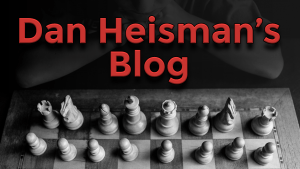Q&A with Coach Heisman Jun 27, 2014
"I did action X and gained Y rating points so I suggest everyone should do that."
This claim came up during the show, raising the question: How helpful it would be for others to follow the suggestion? In order to address this issue, we should start by assuming the claimer at least believes what he/she states is true, otherwise the answer is a trivial and resounding "No".
It's difficult to tell the cause and effect of the claimer. It would be nice if we could determine whether he/she did only action X (such as read a certain book) exclusively during that period, but we can't. Further, it's unlikely that they did only action x without doing other chess activities such as playing games, reviewing those games, and discussing games with other players. And even if he did exclusively action X during that period, that may not have been the only effect, as it is possible for players to assimilate other knowledge they learned earlier during that time period.
Then we have the completely different issue that what works for player A, with his unique background and predelictions, might fail miserably for player B.
So the next time you hear someone claim that they went from 1100 to 1600 by reading "My System", please take it with a grain of salt. It doesn't mean they are lying - no reason to believe that - it's just that if you go out and make Nimzovich's estate a little wealthier, it's unlikely you will pick up 500 rating points just from that venture  .
.
Ratings are not absolute!
I get many questions involving rating, and often the questioner assumes the Elo rating system is absolute: that a 1500 rating on one server (rating pool) is the same as a 1500 rating on puzzle-solving or a 1500 rating on another server or a 1500 FIDE rating. That's not the way the rating system works. Ratings measure your ability relative to others in the rating pool. If the rating pool is everyone in the World, like for FIDE, then you can be pretty sure that players in that same pool with established, clearly higher ratings, are better than others in that pool with much lower ratings.
But take the following example:
Suppose we want to rate the chess players in two rooms, and we will start with all the players as unrated (even if they have a current rating, we will start a new pool).
In room (rating pool) 1, we have 30 first graders who just learned how to play chess yesterday. Still, some have become much better than others already. If we let them play enough games and rate them with the Elo system, with an assumed 1500 mean/median rating and about a 200 point standard deviation, then some of the better players will get ratings up to 2000 and the lower ones down around 1000.
In the room (pool) 2, we have 30 grandmasters who we now are going to re-rate from scratch. If we let them play as many games as the first graders, they are also going to spread out with mean/median 1500, although the spread won't be as wide since the GMs are probably closer in strength, as a group, than the first graders. But still the ratings will probably be from about 1200 to 1800.
Now take the 1500 players from one room and play them against the 1500 players in the other room. No comparison. Even the lowest player in the GM room could probably beat all the other players in the other room simultaneously blindfold, despite his "lower" rating.
This is what happens in rating pools. If we have a server with weak players, like say Yahoo, and compare a 1500 player there with a 1500 player at a stronger server like Chess.com, the 1500 at Chess.com is very likely going to be objectively stronger than the 1500 from Yahoo. We are measuring apples and oranges by the same measurement, but the average apple may be more red (or whatever we are measuring in the fruit) than the average orange.
Moreover, some ratings are purposely biased. If you purchased the old "ChessMaster" software , it was notorious for "rating" the players who played against an engine much more higher. I once got a call from a player who measured 2700 on their scale. He wanted to know if I thought they were really 2700 strength, but USCF or FIDE standards. When I expressed this as highly doubtful, he became indignant. I replied, "No problem; just go out and play in tournaments and prove me wrong!" Unfortunately - but not unexpectedly - it turned out he wasn't about to do that. 
One of my tenets for our Q&A show is not to ask questions that authors write entire books to answer, like "How do you plan?" or "What's the best lines in the Ruy Lopez?" One such question that was asked on my show was "What about the line 1.d4 Nf6 2.c4 g6 3.f3?", which apparently had been more frequently met by the questioner.
Turns out someone did recently write a book about this, and it was not just anyone, but computer guru (Komodo) GM Larry Kaufman, whose recent book is "Sabotage the Gruenfeld", featuring that line. If you want to read an author where each move is carefully researched and checked, you won't get a better one than Larry. His previous opening work was "The Kaufman Repertoire in Black and White".
The next show will be Friday July 11, after my 64th birthday (one for each square on the board!). Cya then and bring a great question 






